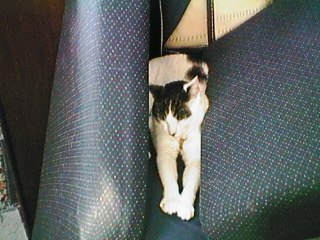







































 |
 |
 |
 |
 |
 |
 |
 |
 |
 |
 |
 |
 |
 |
 |
 |
 |
 |
 |
 |
 |
 |
 |
 |
 |
 |
 |
 |
 |
 |
 |
 |
 |
 |
 |
 |
 |
 |
 |
 |
Two weeks before our planned departure in May 1999 we moved them along with us to the boat at our marina to help them get adjusted. The ride in the car was quite traumatic. Both cats cried as though someone was killing them during the trip. Once aboard the boat, Apollo mostly hid in the V-berth while Atlas the more adventurous of the two started exploring. In time both were busy exploring all the cabinets and compartments. We didn't start the engine for almost a week, then we left the dock for a brief sail and anchored overnight. They discovered they didn't like the engine much, nor did they care for heeling. Atlas did have a strange problem a few months after the start of our trip; he would hide in the litterbox for hours if the engine was on. He did this for about a month, then thankfully his comfort zone become the spot just in front of the box.
We left the dock end of May 1999 for good and spent very few nights at the dock afterwards. Most of the time they spent down below sleeping. When we sailed they didn't sleep too well, but seemed fairly comfortable once they got the hang of being on the low side. Even after a rough sail they recovered quite quickly and never seemed mad at us (they never caught on that we had something to do with the circumstances). They only got seasick once on a rough offshore passage. We did get concerned when doing the longer overnight sails that they didn't drink enough so sometimes we mixed water in with their dry food. We felt terrible for them when the weather got so hot in the Chesapeake in July before we were able to head north. At least we had been able to cool off by swimming, whereas they weren't too interested in that!
They didn't wear life preservers or tethers. We put up netting on both sides which probably helped them (and us) feel more secure when they walked around the deck. Summer of 1999 once it got so hot, we usually left the boat fully open at night without screens and they quickly had full reign on the boat, even when we left the boat. Occasionaly if we were in an area with a lot of current we would put the hatch screens on to keep them inside so we didn't worry when we were off the boat or during the night. They never fell in intentionally. Apollo only fell in when Joyce put him on the dock and he tried to jump back on, but got tangled in the netting and fell in the water beside the boat. Atlas only fell in after we recently returned to Annapolis to a marina and we tried to keep him on the boat by barricading him and he tried to jump over the cushions, but he didn't quite make the leap all the way to the dock.
The litter box was a fact of life. In the beginning we kept the box in the main cabin, but eventually we ended up moving it under the V-berth which worked out much better. We found it kept it out of our main living area and helped keep the tracking down. We still swept the litter up at least 2-3 times a day. A separate shower stall would have been an ideal location if we had had one. It helped to have a covered box and we tried to give it a thorough cleaning often. We did not want to train the cats to use the toilet and we also didn't want to train them to use astroturf, as some other sailors have suggested.
Over time, Atlas and Apollo have adjusted to the cruising lifestyle remarkably well, especially after hearing stories from other cruiser's about their cats. They actually seemed to become more sociable with us (and as Joyce's mom says "less neurotic"), probably due to all the quality time we spent with them. It will be interesting to see how they adapt back to land-life and much more time alone...